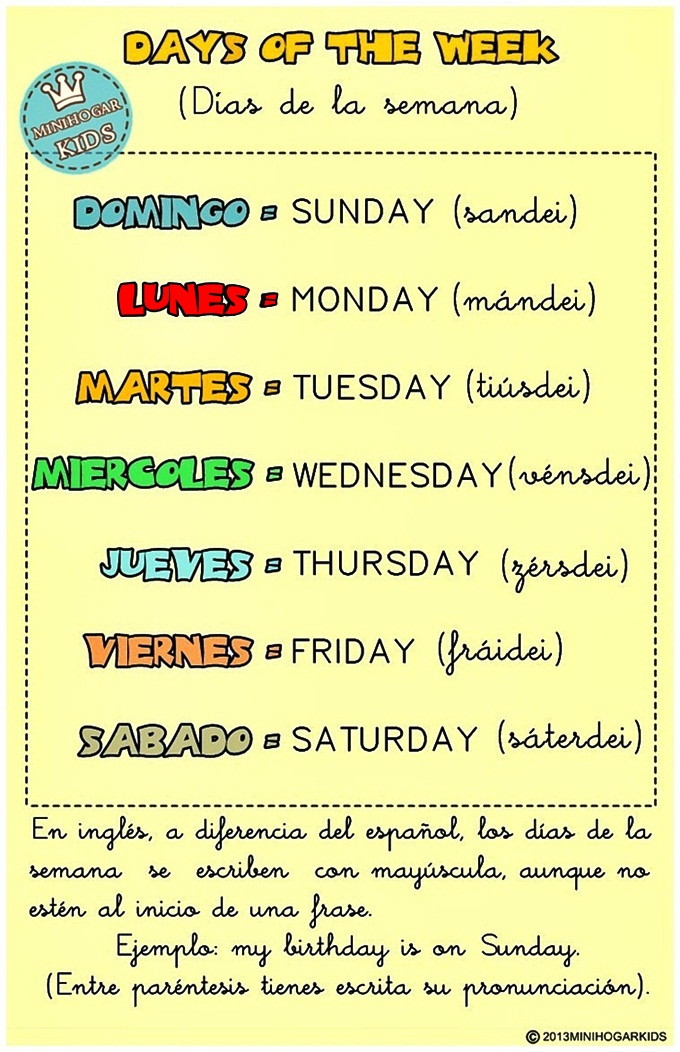Unlock Your Spanish: Mastering the Days of the Week
Have you ever found yourself struggling to remember a simple appointment or event because you couldn't recall the day of the week in Spanish? Learning the days of the week, or "los días de la semana" in Spanish, is a fundamental building block for anyone embarking on their Spanish language journey. It's more than just vocabulary; it's a gateway to understanding cultural nuances and navigating everyday conversations.
Imagine confidently making plans with Spanish-speaking friends, scheduling business meetings, or simply understanding the daily specials at your favorite local restaurant. This foundational knowledge unlocks a world of possibilities, making your interactions smoother and more meaningful. This article will equip you with the tools you need to master los días de la semana, from their origins and meanings to practical tips for memorization.
The Spanish names for the days of the week, much like their English counterparts, have roots in Roman mythology and astronomy. Each day is associated with a celestial body: the Sun, the Moon, and five visible planets. Understanding these connections can make remembering the days easier and add a layer of cultural richness to your learning experience. For instance, "lunes" (Monday) comes from "Luna" (Moon), while "martes" (Tuesday) is linked to Mars, the Roman god of war.
Why is learning "los días de la semana en español" so crucial? It’s about more than just reciting a list of words. It’s about integrating yourself into the rhythm of the Spanish language and culture. Knowing the days of the week is essential for scheduling, making appointments, understanding calendars, and following conversations about daily routines. It's a practical skill that will empower you in countless situations.
Beyond the practical benefits, learning los días de la semana also provides a glimpse into the historical and cultural influences that have shaped the Spanish language. By understanding the origins of these words, you'll gain a deeper appreciation for the language and its rich history. This knowledge will make your learning journey more engaging and rewarding.
The days of the week in Spanish are: lunes (Monday), martes (Tuesday), miércoles (Wednesday), jueves (Thursday), viernes (Friday), sábado (Saturday), and domingo (Sunday). Notice that unlike in English, the days of the week are not capitalized in Spanish unless they begin a sentence.
One benefit of learning the days of the week is improved scheduling and planning. For example, if someone says, "Nos vemos el jueves," you'll know they mean "See you on Thursday." Another benefit is enhanced comprehension of daily conversations. You'll be able to follow along when people discuss their weekly routines or make plans for the weekend. Finally, knowing the days of the week helps build a solid foundation for further Spanish language learning. It’s a key stepping stone to mastering more complex grammar and vocabulary.
A simple action plan for learning the days of the week could involve creating flashcards, practicing with online quizzes, and using the words in daily conversations. Try incorporating them into your schedule by saying things like, "Hoy es martes" (Today is Tuesday) or "Mañana es miércoles" (Tomorrow is Wednesday).
Advantages and Disadvantages of Mastering the Days of the Week
| Advantages | Disadvantages |
|---|---|
| Improved communication | Potential for minor confusion with similar-sounding words in other languages |
| Enhanced cultural understanding | Requires consistent practice for memorization |
Five best practices for learning the days of the week include repetition, using visual aids like flashcards, incorporating the words into your daily routine, practicing with a language partner, and using online resources like language learning apps.
Frequently Asked Questions:
1. Are the days of the week capitalized in Spanish? No, except at the beginning of a sentence.
2. What is the Spanish word for Sunday? Domingo.
3. How do you say "days of the week" in Spanish? Días de la semana.
4. What is the origin of the word "lunes"? It comes from "Luna," meaning moon.
5. What is the easiest way to memorize the days of the week? Using flashcards and repetition.
6. How can I practice using the days of the week in conversation? Try talking about your weekly schedule with a language partner.
7. Are there any online resources for learning the days of the week? Yes, many language learning apps and websites offer exercises and quizzes.
8. How important is it to learn the days of the week when learning Spanish? It's fundamental for basic communication and scheduling.
One tip for remembering the days of the week is to create a song or rhyme using the words. This can make learning more fun and engaging.
In conclusion, mastering "los días de la semana en español" is a fundamental step in your Spanish language journey. From practical benefits like improved scheduling and comprehension to a deeper understanding of cultural and historical influences, this knowledge empowers you to connect with the Spanish-speaking world on a more meaningful level. By implementing the tips and strategies outlined in this article, you can confidently integrate these essential words into your vocabulary and unlock a world of communication and cultural exploration. Don't wait any longer – start learning los días de la semana today and witness the transformative impact it has on your Spanish language skills. Embrace the challenge, be consistent in your practice, and enjoy the rewarding journey of language acquisition. Start now and open doors to new connections and experiences.
Bio plasma center near me your questions answered
Are jack and kristina wagner still married the truth about the gh stars
Unpacking the controversy an in depth look at fck los gemelos de sinaloa lyrics












